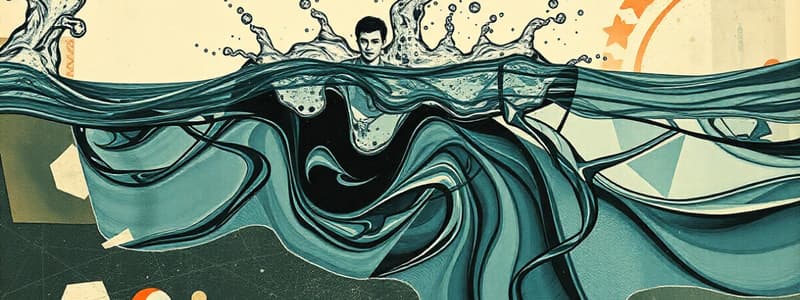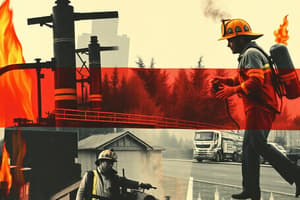Podcast
Questions and Answers
Which metal listed has the highest rate of heat conductivity?
Which metal listed has the highest rate of heat conductivity?
- Copper (correct)
- Steel
- Iron
- Lead
What is the proper fuse rating for a 600 watt appliance on a 220 volt supply?
What is the proper fuse rating for a 600 watt appliance on a 220 volt supply?
- 13 amp
- 3 amp
- 1 amp
- 6 amp (correct)
What is relative density?
What is relative density?
- Density of a substance divided by its volume
- Force exerted by the density of a substance
- Density of water displaced when a substance is placed in water
- Density of a substance in comparison to the density of water (correct)
Which metal requires treatment to prevent atmospheric corrosion?
Which metal requires treatment to prevent atmospheric corrosion?
During electrolytic action, what will gradually destroy the anode?
During electrolytic action, what will gradually destroy the anode?
At what temperature does water freeze?
At what temperature does water freeze?
Water reaches its maximum density at which temperature?
Water reaches its maximum density at which temperature?
What is the approximate pressure at a tap if the head of water above it is 3.0 metres?
What is the approximate pressure at a tap if the head of water above it is 3.0 metres?
Which of the following materials offers the greatest resistance to water flow?
Which of the following materials offers the greatest resistance to water flow?
What is the heat energy required to heat 1 kg of copper by 2°C?
What is the heat energy required to heat 1 kg of copper by 2°C?
Which process involves atmospheric pressure for movement?
Which process involves atmospheric pressure for movement?
What describes the transfer of heat by radiation most accurately?
What describes the transfer of heat by radiation most accurately?
What directly causes permanent hardness in water?
What directly causes permanent hardness in water?
Which metal listed is commonly treated to prevent corrosion from atmospheric exposure?
Which metal listed is commonly treated to prevent corrosion from atmospheric exposure?
What is the maximum amp rating for socket outlets in a typical domestic setting?
What is the maximum amp rating for socket outlets in a typical domestic setting?
During what condition is it recommended for a plumber to utilize temporary earth continuity bonds?
During what condition is it recommended for a plumber to utilize temporary earth continuity bonds?
What is the electrical current drawn by a 600 watt appliance connected to a 220 volt supply, rounded to the nearest amp?
What is the electrical current drawn by a 600 watt appliance connected to a 220 volt supply, rounded to the nearest amp?
Which of the following tubes would exhibit the least capillary attraction?
Which of the following tubes would exhibit the least capillary attraction?
At what temperature does water reach its maximum density?
At what temperature does water reach its maximum density?
What causes permanent hardness in water?
What causes permanent hardness in water?
Which measurement device is most suitable for assessing the temperature in a heating system's pipework?
Which measurement device is most suitable for assessing the temperature in a heating system's pipework?
The effective transfer of heat energy by radiation primarily occurs through which medium?
The effective transfer of heat energy by radiation primarily occurs through which medium?
Which characteristic of hard water can lead to reduced efficiency in domestic systems?
Which characteristic of hard water can lead to reduced efficiency in domestic systems?
What is the primary principle behind the process of siphonage?
What is the primary principle behind the process of siphonage?
Which type of pipe material is most likely to exhibit the least resistance to water flow?
Which type of pipe material is most likely to exhibit the least resistance to water flow?
What heat energy is required to increase the temperature of 1 kg of copper by 2°C given its specific heat capacity?
What heat energy is required to increase the temperature of 1 kg of copper by 2°C given its specific heat capacity?
Flashcards
Capillary attraction
Capillary attraction
The force of attraction between a liquid and a solid surface, causing the liquid to rise or form a meniscus.
Relative density
Relative density
The ratio of the density of a substance to the density of water at a specific temperature.
Heat conductivity
Heat conductivity
The ability of a material to transfer heat energy.
Atmospheric corrosion
Atmospheric corrosion
Signup and view all the flashcards
Electrolytic action
Electrolytic action
Signup and view all the flashcards
Water's freezing point
Water's freezing point
Signup and view all the flashcards
Water's maximum density
Water's maximum density
Signup and view all the flashcards
Water pressure
Water pressure
Signup and view all the flashcards
Siphonage
Siphonage
Signup and view all the flashcards
Water flow resistance
Water flow resistance
Signup and view all the flashcards
Specific heat capacity
Specific heat capacity
Signup and view all the flashcards
Water hardness
Water hardness
Signup and view all the flashcards
Which tube has the greatest capillary attraction?
Which tube has the greatest capillary attraction?
Signup and view all the flashcards
What is relative density?
What is relative density?
Signup and view all the flashcards
Which metal has the best heat conductivity?
Which metal has the best heat conductivity?
Signup and view all the flashcards
Which metal needs protection from atmospheric corrosion?
Which metal needs protection from atmospheric corrosion?
Signup and view all the flashcards
What happens to the anode during electrolytic action?
What happens to the anode during electrolytic action?
Signup and view all the flashcards
Study Notes
Scientific Principles Mock 2 - Study Notes
-
Question 1: Water freezes at 0°C.
-
Question 2: Water reaches its maximum density at 4°C.
-
Question 3: The approximate pressure at a tap 3.0 metres above the water source is 0.3 Bar.
-
Question 4: Water pressure is greatest at hole A in Figure 1.
-
Question 5: Galvanised LCS pipe material offers the greatest resistance to water flow.
-
Question 6: Siphonage utilises atmospheric pressure.
-
Question 7: A bimetallic strip should be used to measure the temperature of flow and return pipework in a heating system.
-
Question 8: 0.77 kJ of heat energy is needed to heat 1 kg of copper by 2°C. (Specific heat capacity of copper is 0.385 kJ/kg °C).
-
Question 9: Heat is transferred by radiation in straight lines.
-
Question 10: Permanent hardness in water is caused by the solvent ability of water to dissolve calcium sulphate.
-
Question 11: The direct result of hard water in domestic properties is reduced system efficiency.
-
Question 12: The effect of electrolytic action on a metal depends on its position in the electromotive series.
-
Question 13: Capillary attraction is greatest in tube A in Figure 2.
-
Question 14: Relative density is the density of a substance in comparison to the density of water.
-
Question 15: Copper has the highest rate of heat conductivity.
-
Question 16: Iron needs treatment if exposed to atmospheric corrosion.
-
Question 17: During electrolytic action the cathode is gradually destroyed.
-
Question 18: The fuse rating for a 600-watt appliance on a 220-volt supply is approximately 2.73 amps (calculated: 600W / 220V = 2.73A).
-
Question 19: Socket outlets in a domestic property usually have a maximum amp rating of 13 amps.
-
Question 20: Temporary earth continuity bonds would be most appropriate for a plumber during tasks like flushing a domestic hot water system, or working on a central heating control panel, or changing a cold water tap washer, or removing a section of system pipework.
Studying That Suits You
Use AI to generate personalized quizzes and flashcards to suit your learning preferences.




